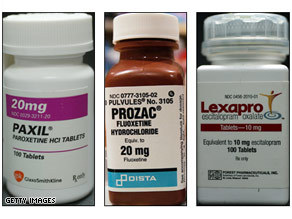The doctor suggested she try an antidepressant to make herself feel better.
She got the antidepressant, and she did feel better, said Dr. Dworkin, a Maryland anesthesiologist and senior fellow at Washington's Hudson Institute, who told the story in his book "Artificial Unhappiness: The Dark Side of the New Happy Class." But in the meantime, Dworkin says, the woman's husband led the family into financial ruin.
"Doctors are now medicating unhappiness," said Dworkin. "Too many people take drugs when they really need to be making changes in their lives."

|
| Antidepressants are America's most-prescribed drugs. |



Comment: It should be obvious to anyone with any shred of conscience or empathy combined with a competent understanding of human psychology, that the reactions of discomfort, unhappiness and depression are normal healthy responses to the traumatic stimuli provided by the ponerized world that surrounds us.